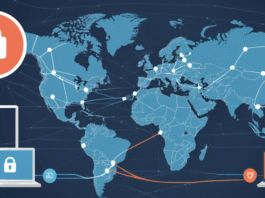Critical Vulnerability in Google Cloud Platform
Researchers from Tenable Research have discovered a critical vulnerability that could potentially allow malicious code to be executed on millions of Google servers. The security flaw, named “CloudImposer,” affects Google’s Cloud Composer, a tool for orchestrating software pipelines on the Google Cloud Platform.
Tenable Research identified a critical RCE (Remote Code Execution) vulnerability in the Google Cloud Platform.
The flaw discovered by Tenable in the Google Cloud Platform opens the door to a type of supply-chain attack known as “Dependency Confusion.” An attacker could inject a malicious package into Google’s internal systems and potentially access the systems of its customers.
Issues with Python Package Management
The problem arose from insecure handling of Python package management in the GCP documentation. Google recommended using the --extra-index-url argument when installing private packages. This argument causes both the private and public PyPI repositories to be searched. This allows attackers to upload a malicious package to the public repository with the same name as an internal package. Since pip, the Python package installation tool, prefers the package with the higher version number when two packages have the same name, attackers could take control of the system.
CloudImposer exploits this vulnerability, enabling remote code execution on Google servers. The GCP services most affected are App Engine, Cloud Functions, and Cloud Composer, highlighting the potential scale of the damage. Since Google Cloud Composer is a managed version of Apache Airflow, a widely used open-source tool for managing data pipelines, a successful attack could have far-reaching consequences. The Apache Airflow code has been downloaded over 22 million times, illustrating the extent of the problem.
Tenable Research Presented Findings at Black Hat USA 2024
Tenable Research presented these findings at Black Hat USA 2024, emphasizing the urgency of being aware of the dangers of Dependency Confusion. This type of attack was discovered by Alex Birsan in 2021. It is now recommended to use the safer --index-url argument, which points to a single repository, thereby minimizing the risk of an attack.
After disclosing the security issue, Google corrected the script responsible for installing private packages in Cloud Composer and reviewed the potentially affected packages. There is no evidence that CloudImposer has been exploited in practice, but the Tenable team demonstrated that their code was executed on Google’s internal servers.
Introduction to the Cloudimposer Vulnerability
The recent discovery of the critical vulnerability, dubbed ‘Cloudimposer’, has raised significant concerns within the cybersecurity community. This flaw was identified by the research teams at Tenable and pertains specifically to Google Cloud Composer, a vital service within the Google Cloud Platform (GCP) ecosystem. Cloud Composer serves as an orchestration tool that allows developers to automate and manage workflow processes seamlessly. However, the Cloudimposer vulnerability introduces a potential risk for millions of Google servers, enabling malicious entities to execute detrimental code within these environments.
Cloudimposer arises from a complex interplay of components within Google Cloud Composer, which relies heavily on various software packages and extensions to function efficiently. When exploited, this vulnerability not only jeopardizes the integrity of the affected systems but also raises alarms regarding broader security implications that may extend beyond the immediate infrastructure. Attackers could leverage this flaw to gain unauthorized access, manipulate data, and potentially disrupt operational continuity for countless organizations that utilize GCP for their cloud needs.
The ramifications could be profound, impacting not just individual users or companies, but also the overall trust in cloud service offerings. As businesses increasingly migrate their operations to cloud-based platforms, the security of these environments becomes paramount. The introduction of Cloudimposer highlights the pressing need for vigilant cybersecurity measures and timely updates from cloud service providers. It underscores the importance of understanding the dependencies involved in cloud architectures and the potential vulnerabilities that can be introduced through interconnected services.
In light of this discovery, it is crucial for users and administrators of Google Cloud Composer to remain informed about the evolving nature of cloud security threats and to take proactive steps to mitigate potential risks associated with the Cloudimposer vulnerability.
Understanding the Mechanism of Dependency Confusion
The issue of dependency confusion is critical in the context of package management systems, particularly within environments such as Google Cloud Platform (GCP). This vulnerability arises when a malicious actor exploits the discrepancies between public and private package repositories. In the case of the Cloudimposer incident, the weakness revolves around the handling of package installation tools, such as pip, in conjunction with the –extra-index-url option. This option allows users to specify additional package repositories, which can inadvertently lead to the installation of malicious packages.
When developers rely on public repositories for package installations without adequate controls, they become susceptible to dependency confusion attacks. An attacker can create a forged package that mimics a legitimate internal package name and publish it to a public repository, such as PyPI. If a developer inadvertently specifies the –extra-index-url in their configuration, the package manager might prioritize the public package, leading to the installation of the malicious version instead of the intended secure version. As a result, internal systems can be compromised, allowing attackers to execute arbitrary code, gain unauthorized access to sensitive data, or escalate privileges within the system.
The Cloudimposer vulnerability underscores the need for comprehensive best practices in package management. Organizations using GCP must assess their dependency management processes to identify potential insecurities. Tools can be employed to enforce package integrity checks by verifying hashes and ensuring that packages originate from trusted sources. Regular audits and monitoring of dependencies can also play a significant role in protecting systems from these types of attacks. Moreover, it’s imperative for developers to adhere to the principle of least privilege and restrict access to package repositories to mitigate the risks associated with dependency confusion.
Impact and Scope of the Vulnerability on Google Cloud Services
The Cloudimposer incident presents significant implications for various Google Cloud services, most notably App Engine, Cloud Functions, and Cloud Composer. The vulnerability stems from its association with Apache Airflow, which has garnered extensive adoption within the cloud service infrastructure, making it a critical point of concern. As Apache Airflow is leveraged by numerous organizations to orchestrate complex workflows, the Cloudimposer vulnerability could potentially expose sensitive data and compromise operational integrity across a wide array of applications.
One of the most alarming aspects of this vulnerability is its potential to facilitate supply-chain attacks. Attackers could exploit the flaw to gain access to the underlying systems of organizations using Google Cloud. Such access could enable them to manipulate data flows, disrupt services, or even lead to unauthorized data exfiltration. The ramifications extend beyond immediate service interruptions; they can trigger a cascade of security incidents affecting customer trust and operational resilience.
Statistics reveal that Apache Airflow is utilized by thousands of organizations worldwide, emphasizing the scale of the vulnerability. As per recent reports, Airflow manages workflow orchestration for more than a quarter of the Fortune 500 companies, highlighting its importance in data management and operational processes. Given this widespread adoption, the exploitation of the Cloudimposer vulnerability could potentially impact millions of users, elevating the urgency for immediate remediation.
Furthermore, the broader implications for customers are profound. Organizations relying on Google Cloud services must reassess their risk management strategies, particularly those integrating Apache Airflow into their workflows. Understanding the risks associated with such vulnerabilities is crucial for maintaining data integrity and operational continuity. This incident should serve as a stark reminder of the complexities and security challenges prevalent in modern cloud ecosystems.
Tenable Research’s Presentation and Google’s Response
During Black Hat USA 2024, Tenable Research conducted a critical presentation highlighting the alarming discovery of a vulnerability within the Google Cloud Platform, referred to as the Cloudimposer incident. This incident underscored the significant risks posed by dependency confusion attacks—an increasingly prevalent method indicating the necessity for heightened awareness within the software development community. The presentation outlined how these attacks leverage the complexity of package management systems, leading to potentially compromised application environments. By illustrating real-world scenarios in which dependency confusion can be exploited, Tenable effectively conveyed the urgency for developers and organizations to remain vigilant and proactive in defense strategies.
In response to the disclosure of this vulnerability, Google took immediate action. The company prioritized the remediation of the issues by addressing the installation scripts that were identified as vectors for the attacks. This included a comprehensive review of packages that could potentially be affected, thereby ensuring the integrity of the Google Cloud environment. Google’s commitment to the prompt correction of these vulnerabilities reflects its ongoing dedication to securing its cloud services and protecting customer data. Such actions reinforce the importance of a swift response in the tech industry, ensuring that vulnerabilities are mitigated effectively before they can be exploited.
Additionally, Tenable and Google jointly emphasized the need for safer package management practices. One suggested measure is the usage of the recommended –index-url argument, which can help in mitigating the risks associated with dependency confusion. This argument aids developers in specifying a secure and verified package repository, thereby reducing chances of inadvertently introducing malicious packages into their development workflow. The Cloudimposer incident serves as a pivotal reminder that collaborative efforts between research organizations and cloud service providers are essential in cultivating a secure digital environment.




